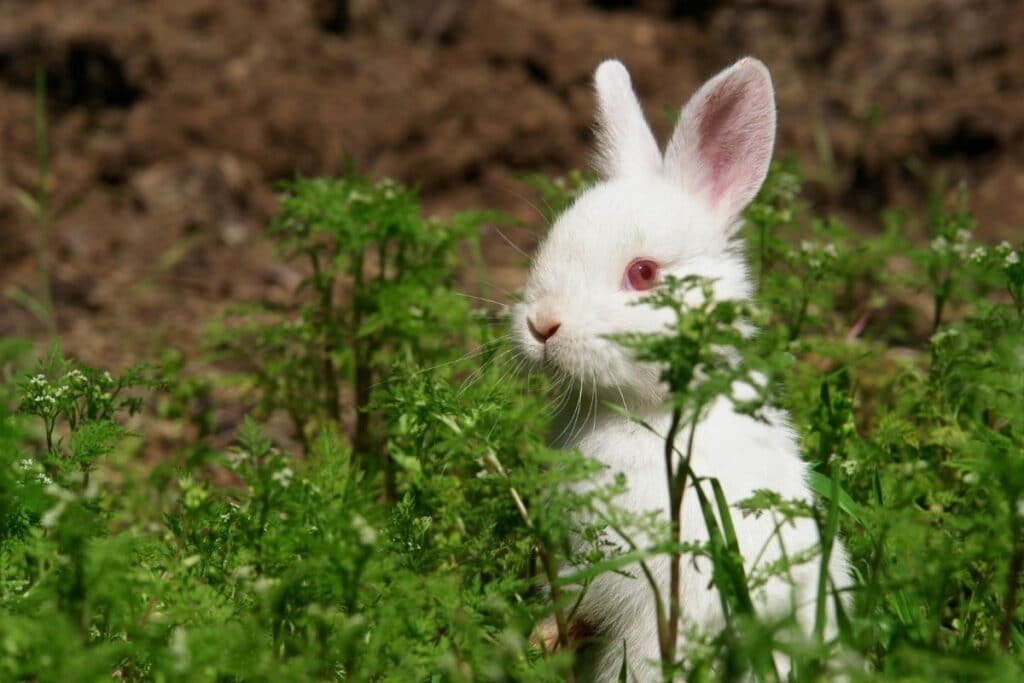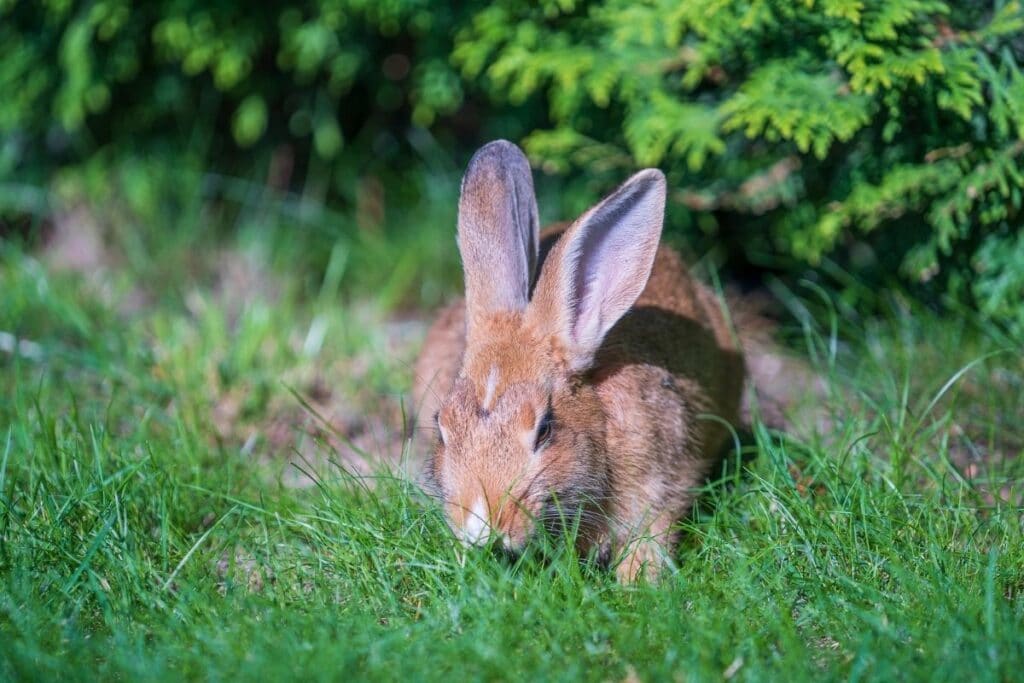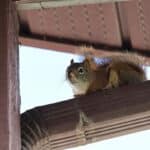Are you curious about how to keep rabbits out of your garden? This post is your ultimate guide.
Rabbits are an adorable part of nature. If they come around your lush garden and home, it’s a good sign that they consider your property to be a safe space. With that being said, however, the truth is that rabbits can wreak havoc in the garden.
If rabbits have been eating your ornamental plants, fruits, and vegetables, it may be time to take preventive measures to keep bunnies out of the garden.
So if the rabbits in your neighborhood have crossed the line from cute to chaotic, then keep on reading for some tips about how to deter rabbits from your yard indefinitely.
What Attracts Rabbits to the Garden?
Rabbits are fluffy and endearing wild animals. We always enjoy it when wild rabbits come hopping around the yard. Except for when the little rascals get into the garden and chew on our plants.
Unfortunately, rabbits love our gardens for many of the same reasons we do. After the winter, in the spring, rabbits love to forage on newly sprouted grasses and clover. When food is less available during the fall and winter, rabbits survive by feeding on hardy winter plants, shrubs, and tree bark.
Rabbits are also attracted to the food you grow in the garden. They love the delicious produce you’ve worked so hard to grow. Favorite fruits, vegetables, and herbs that rabbits love include:
- Beets
- Broccoli
- Beans
- Carrots
- Lettuce
- Peas
- Cilantro
- Parsley
- Almonds
- Apples
- Berries
- Plums
It’s also not uncommon for rabbits to feed on ornamental flowers, trees, and shrubs. If you ever observed gnawing or chewing on plant parts, along with the presence of animal droppings and footprints, it’s normally safe to say that rabbits are the culprit.
How to Keep Rabbits Out of Your Yard
Deterring rabbits from your garden can be a tiresome ordeal. Rabbits are cunning animals, and stubborn, especially if they know your garden includes some of their favorite foods. The good news is that deterring rabbits from your yard is not impossible.
You may just need to experiment with preventative measures in order to find the most effective strategy for you and your garden.
The best strategies for deterring rabbits from our garden revolve around a few important elements:
- Protective barriers: barriers, like chicken wire, make it physically more difficult for rabbits to enter.
- Strong aromas: repellent products utilize certain aromas that encourage rabbits to stay away.
- Scare tactics: rabbits and easily scared, and products like motion-activated sprinklers, fend off rabbits using the elements of surprise.
- Professional guidance: if the rabbits around your home become unbearable, it may be time to consider enlisting the help of a professional to develop an action plan for you.
Rabbits tend to be adaptable, so employing a multi-pronged approach, incorporating at least two of these elements, is often the most effective strategy. This not only discourages them faster but also provides long-term protection for your garden.

What Repels Rabbits From Eating Plants?
Just because rabbits love a lot of the plants we love also doesn’t mean you have to stop growing them. It’s possible to keep rabbits away and grow your favorite fruits and veggies.
Below you’ll find 10 effective strategies to have a rabbit proof garden.
1. Use Protective Barriers
One of the most effective ways to keep rabbits away from your garden is to install protective barriers around your yard border. If you already have garden fencing to keep rabbits out, you may just need to reinforce your current fence. You can also just install a protective barrier around the garden itself.
Chicken wire with 1-inch mesh (or smaller) is by far the most effective barrier to protect your garden from young rabbits.
When installing a chicken wire around your garden, it’s important to remember that rabbits are also skilled diggers. You will need to install the chicken wire at least 6-inches below the topsoil.
2. Utilize Visual Deterrents
Rabbits are creatures of habit. They are also skittish. So if you include new objects in the garden, the very presence of something new may scare them away.
Visual deterrents are the most effective if they move, are shiny, or make noise. When it comes to adding visual deterrents to your garden, here are some ideas:
- Pinwheels
- Rubber snakes
- Owl statues
Another visual deterrent strategy that may help is adding strips of aluminum foil, or some other highly-reflective material, to twine or fishing line that you secure around the perimeter of your garden.
When it comes to visual deterrents, it’s important to note that over time, the rabbits visiting your yard may become accustomed to their presence. That is why it’s important to periodically change their position to keep the rabbits guessing.
3. Remove Rabbit Habitats From Around Your Property
If you have been noticing an increased rabbit presence around the yard and in your garden, it may be because rabbits are nesting nearby. They love to stay close to valuable food sources, which, unfortunately, might be your garden.
Rabbits favor grassy and overgrown areas for nesting, so clearing brush piles, keeping grasses and shrubs well-trimmed, and removing debris piles, firewood, and dense vegetation can significantly reduce their appeal.
Rabbits may also try to nest underneath buildings. We recommend you seal off entrances to the spaces beneath your home, sheds, patios, and backyard decks. If you take away the incentive for rabbits to stick around and create nests, then they will most likely move on to greener pastures and leave your garden alone.
4. Install Motion-Activated Sprinklers
Rabbits are easily scared. One of the most effective ways to scare rabbits away is to install motion-activated sprinklers. When rabbits come hopping along, they will trigger the sprinkler. The noise and sudden movement of the sprinklers will scare the rabbits away without hurting them.
Over time, the rabbits will remember your garden as a scary place. They will choose not to come around and to look for other areas that they consider to be safer.
5. Employ the Help of Your Pets
Sometimes we forget that our pets are more than just snuggle buddies. Cats and dogs can also help deter rabbits (and other pests) from the garden.
The more time that your pets can spend outside and around the yard, the better. The mere presence of them will help keep rabbits away because rabbits consider them to be natural predators.
Plus, your pet’s pheromones, droppings, urine, and fur from their coat will act like deterrents when the pet is not physically close by.
6. Include Plants That Rabbits Dislike
Fortunately, there are certain plants rabbits hate. Including these specific plants into your garden arrays is an easy way to grow a lush garden and deter rabbits at the same time.
Some plants and flowers rabbits won’t eat include:
- Azaleas
- Boxwoods
- Hyacinths
- Daffodils
- Alliums
- Butterfly Bushes
- Japanese Maples
- Mountain Laurels
- Rhododendron
- Peonies
- Lamb’s Ear
- Sedum
- Primrose
- Yucca
- Russian Sage
- Speedwell
- Geranium
- Wax Begonia
You can combine some of these rabbit resistant plants around your yard for the best outcome.
7. Protect Individual Plants
Some plants are more at risk than others. This is especially true for younger seedlings and tender plants. It may be necessary to protect individual plants to discourage rabbits from nibbling on them.
To protect individual plants, we recommend using ¼ to ½-inch mesh chicken wire to form cylinders around new shrubs, trees, vines, fruits, and vegetables. When creating the protective barrier, be sure to leave clearance around the plant to allow it to mature and grow.
If the barrier feels flimsy, it may be necessary to add additional bracing. Extra support will prevent rabbits from leaning on the barrier and pushing it out of the way to score an easy snack.
8. Try Out Raised Garden Beds
When in doubt, plant high. Most rabbits feed at ground level. They very rarely jump up into containers or raised beds to eat their food.
If you put some of the plants in your garden in containers and raised beds, you effectively make it harder for rabbits to enjoy your precious plants. They will more than likely move on to easier pickings. Plus, you will save your lower back. It’s a win-win situation.
9. Spray Rabbit Repellents
Another preventative measure you can take to deter rabbits from your garden is to apply rabbit repellents. Animal repellents work by contact or by odor. In both cases, repellents make the plant unpalatable to the rabbit.
Store-bought repellents are often the most effective. However, you can also make your own homemade repellent. Whether you utilize a homemade solution or a store-bought brand, it’s important to remember to reapply your repellent after rainfall. You should also reapply repellent after you water your plants.
10. Trap the Rabbits
Trapping the pesky rabbits is often the last-ditch effort we recommend. Trapping rabbits is not something you should do by yourself. Dealing with a trapped wild animal can be challenging and unsafe.
In many states, Rabbits are considered to be garden pests. Because they can carry disease, there are often laws that regulate where and how you trap and release wild animals. That is why, if you must trap, we advise you to hire a professional to get rid of rabbits humanely.
How to Prevent Rabbits from Eating Garden
As gardeners we take a lot of pride in the gardens we tend and the variety of plants that decorate and make up the tiny ecosystem outside the walls of our home. Whether we like it or not, rabbits are often a part of that nature that we enjoy.
In fact, the presence of rabbits around your property is a good sign that they consider the space to be useful to them and safe. However, at times, rabbits go too far by munching on and destroying the plants you’ve spent so much energy trying to grow.
If that’s the case, then it’s time to take a stand. The best way to stop rabbits from eating your plants is different for everyone. One of the strategies that we’ve recommended from above may work for your neighbor but not for you. That’s why we often recommend experimenting with your rabbit prevention plans. Often, the best strategy employs a series of strategies instead of just one.
FAQs
What do rabbits hate the most?
Rabbits dislike strong scents and tastes, so they are often deterred by plants with strong aromas like lavender, marigolds, and onions. Additionally, spicy or pungent substances like garlic, chili powder, or vinegar can also deter rabbits.
What deters rabbits from eating plants?
Plants with strong scents or tastes, physical barriers like fencing or netting, and repellents containing natural ingredients like garlic, pepper, or predator urine can deter rabbits from eating plants. Additionally, planting rabbit-resistant species or using raised beds can help protect vulnerable plants.
What is the best rabbit repellent?
The best rabbit repellents often contain natural ingredients like garlic, pepper, eggs, or predator urine. Commercial repellents, as well as homemade solutions using these ingredients, can effectively deter rabbits from feeding on plants.
Do coffee grounds keep rabbits away?
No, coffee grounds are not a reliable long-term deterrent for keeping rabbits away.
How do you make homemade rabbit repellent for plants?
Homemade rabbit repellents can be made using ingredients like garlic, chili powder, onion, vinegar, or eggs. These ingredients can be mixed with water and sprayed directly onto plants or applied as a perimeter spray around the garden. Experiment with different recipes to find one that works best for your garden and local rabbit population.
See more:
*image by orhancam&OlegDoroshenko/depositphotos







